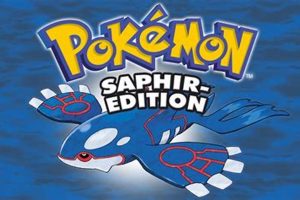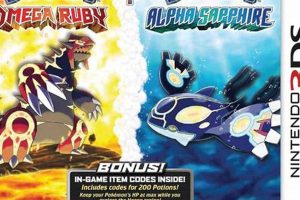Digital files that contain the complete data of the Pokmon SoulSilver game are often sought by individuals seeking to experience the title on platforms other than the original Nintendo DS hardware. These files, typically in a specific file format readable by emulators, are created by extracting the game’s data from the original game cartridge.
Accessing and utilizing these files allows users to engage with the game on a variety of devices, potentially offering enhanced features such as increased resolution, save states, and the ability to use modifications. This approach provides an alternative method to enjoy classic gaming experiences, particularly when the original hardware is unavailable or no longer functioning. This method of accessing a game allows for preservation and accessibility of older titles.
The subsequent sections will delve into the methods of acquiring these files, the emulators required to utilize them, and the legal considerations associated with their use. A clear understanding of these aspects is crucial for individuals considering accessing and playing the game through this method.
Tips for Optimal Experience
Maximizing the experience requires careful attention to detail. This section offers practical guidance for ensuring smooth gameplay and accurate emulation.
Tip 1: Source Verification. Prioritize downloading from reputable sources to minimize the risk of corrupted files or malware infection. Check the website’s security certificate and user reviews before downloading.
Tip 2: Emulator Selection. Choose an emulator that is compatible with the system and known for its stability and accuracy. Research compatibility reports and performance benchmarks for various emulators.
Tip 3: BIOS Files. Certain emulators necessitate a BIOS file from the original hardware to function correctly. Ensure that a legally obtained BIOS file is properly configured in the emulator’s settings.
Tip 4: Configuration Optimization. Adjust emulator settings to achieve optimal performance on the specific hardware. Experiment with resolution scaling, frame skipping, and other settings to find the best balance between visual fidelity and performance.
Tip 5: Save States. Utilize the emulator’s save state feature regularly to preserve progress and avoid potential data loss due to emulator crashes or other unexpected issues.
Tip 6: Controller Mapping. Configure controller mappings to provide a comfortable and intuitive gaming experience. Most emulators offer extensive customization options for controller inputs.
Effective source verification, emulator configuration, and strategic utilization of features can significantly enhance enjoyment of the game. The tips provided aim to increase the reliability and performance of the emulation setup.
The following section will address the legal and ethical aspects related to accessing and using digital game files.
1. Acquisition methods
Acquisition methods for digital game files are intrinsically linked to the distribution and accessibility of Pokmon SoulSilver. These methods, primarily involving downloading files from internet sources, constitute the initial point of access for individuals seeking to experience the game outside of its original retail format. The nature of acquisition, whether through direct downloads from websites, file-sharing networks, or other online platforms, has a direct impact on the integrity and security of the file obtained.
For instance, obtaining a file from an untrusted source can expose users to the risk of downloading a corrupted file, or, more seriously, a file infected with malware. A real-life example includes the prevalence of websites falsely advertising legitimate game files, but which instead distribute viruses or other malicious software. Conversely, acquiring the file from a reputable source, often requiring verification of the file’s integrity through checksums, mitigates these risks and ensures a safer experience. The choice of acquisition method, therefore, directly influences the user’s experience and security.
In conclusion, a thorough understanding of the available acquisition methods is essential when seeking to obtain digital game files. Prioritizing secure and verified sources minimizes the risk of encountering compromised files and ensures the integrity of the desired gaming experience. The methods employed in acquiring the digital game file are not merely a means to an end but rather a critical factor that determines the safety, reliability, and overall quality of the experience.
2. Emulation software
Emulation software is a fundamental component for utilizing digital game files. These programs, such as DeSmuME, NO$GBA, and MelonDS, function by replicating the hardware and software environment of the original Nintendo DS. The digital game file is essentially a data container; without appropriate emulation software, it remains an inert set of data, incapable of executing its programmed instructions. The functionality of the game experience is directly dependent on the capabilities and accuracy of the software, directly affecting gameplay and overall functionality.
The compatibility between the digital game file and emulation software is not always guaranteed. Different emulators possess varying degrees of accuracy in their hardware replication. For instance, some emulators may struggle to accurately render the 3D graphics or process the complex audio streams of the game, resulting in visual glitches, audio stuttering, or even complete crashes. Moreover, the emulation software’s settings and configuration can significantly impact the game’s performance. Incorrectly configured settings can lead to slowdowns, input lag, or other issues that detract from the user experience. Consider an instance where an emulator lacks proper support for certain graphics rendering techniques present in the game. This would lead to distorted visuals or missing effects, severely impacting immersion. The role of emulation software is, therefore, pivotal in realizing the intended experience. The settings and configuration require attention to ensure correct performance.
In summary, emulation software serves as the essential bridge between the digital game file and the user. Its capacity to accurately replicate the original hardware and software environment determines the fidelity and enjoyment of the gaming experience. Choosing a compatible and well-configured emulator is crucial for achieving an experience that closely mirrors the original, authentic format.
3. Legality concerns
The utilization of digital game files is directly intertwined with copyright law and intellectual property rights. Obtaining and using a Pokmon SoulSilver file without owning the original game cartridge constitutes copyright infringement in most jurisdictions. The digital file represents a digital copy of the copyrighted work, and unauthorized reproduction or distribution violates the rights of the copyright holder, typically Nintendo and/or The Pokémon Company. The act of downloading, sharing, or playing a digital game file without proper authorization can result in legal repercussions, including fines and other penalties.
One key exception to this general rule is the concept of “backup copies,” sometimes referred to as archival copies. In a limited number of jurisdictions, individuals may be permitted to create a personal backup copy of software, including games, provided that they legally own the original. However, even in these cases, the legality of sharing or distributing the backup copy remains highly restricted. A real-world example involves Nintendo’s proactive stance against websites and individuals involved in distributing game files, frequently issuing cease-and-desist notices and pursuing legal action against those who violate their copyright. This underscores the seriousness with which copyright holders protect their intellectual property and the potential legal ramifications associated with unauthorized distribution or usage.
Therefore, a comprehensive understanding of copyright law is essential for anyone considering utilizing digital game files. While the convenience and accessibility of these files are undeniable, engaging with them without proper authorization carries significant legal risks. Prior to obtaining or using such files, it is imperative to ascertain the legality of doing so within the relevant jurisdiction and to ensure compliance with all applicable copyright laws. Legal ownership of the original game generally provides the strongest defense against claims of copyright infringement. Ignoring legality concerns bears potential legal consequences.
4. Hardware compatibility
Hardware compatibility is a primary determinant of the playability of Pokémon SoulSilver digital game files. The target device, be it a desktop computer, laptop, mobile phone, or handheld console, must possess the necessary processing power, memory, and graphical capabilities to run the emulation software efficiently. Insufficient hardware resources can lead to performance issues, such as low frame rates, audio distortion, or even crashes, rendering the game unplayable. For example, attempting to run a demanding Nintendo DS emulator on an outdated mobile phone with limited processing power will likely result in a severely degraded gaming experience.
The choice of emulation software also influences hardware compatibility requirements. Some emulators are more resource-intensive than others, demanding a higher level of hardware specifications to achieve smooth performance. Optimization settings within the emulator can be adjusted to reduce the load on the hardware, but these adjustments may also compromise graphical fidelity or introduce other artifacts. Moreover, the operating system of the target device plays a crucial role. Certain emulators are designed specifically for particular operating systems, and attempting to run them on an incompatible system may result in errors or complete failure. An example is that some of Nintendo DS emulators run best on Windows, whereas others are optimised for Android or Linux.
In summary, ensuring hardware compatibility is critical for achieving an enjoyable game experience. A mismatch between the hardware resources of the target device and the requirements of the emulation software can severely compromise performance and playability. A careful evaluation of hardware specifications and emulator compatibility is essential before attempting to utilize digital game files. A strong understanding of this connection increases the likelihood of an experience aligned with expectations.
5. Modifications/Enhancements
Modifications and enhancements represent a significant aspect of engaging with digital game files. These alterations, often created by third-party developers or dedicated fans, modify the original game’s code and assets to introduce new features, alter gameplay mechanics, or improve visual aspects. These modifications can be applied to a digital game file to create a distinct variation of the original game. The prevalence and popularity of these enhancements stem from a desire to personalize the gaming experience, overcome limitations present in the original game, or explore new possibilities not initially envisioned by the game’s developers. As an example, difficulty enhancement modifications, such as those applied to Pokémon SoulSilver, can increase the challenge of the game by modifying enemy stats, restricting access to items, or altering the game’s AI.
The range of modifications available varies widely, spanning from simple texture replacements that enhance visual clarity to complex code alterations that fundamentally change gameplay. Some common modifications include graphical upgrades, difficulty adjustments, added content (such as new areas or characters), and quality-of-life improvements. The use of these modifications also raises legal and ethical considerations. While creating modifications for personal use is generally considered acceptable, distributing them without the copyright holder’s permission constitutes copyright infringement. Many modification creators offer disclaimers asserting that their work is intended for personal use only and that they do not condone the illegal distribution of copyrighted material. The application of these modifications improves the game’s aspects, leading to a more interactive experience.
In conclusion, modifications and enhancements play a significant role in extending the life and versatility of digital game files. They offer users the opportunity to customize the gaming experience and overcome perceived limitations in the original release. However, navigating the world of modifications requires careful consideration of copyright law and ethical responsibilities. A responsible approach involves respecting copyright holders’ rights and avoiding the distribution of unauthorized copies of modified game files. The proper utilization of enhancements adds value to the gaming experience, while understanding its legal ramifications adds to ethical gameplay.
Frequently Asked Questions
This section addresses common inquiries regarding digital game files, aiming to provide clarity and dispel misconceptions.
Question 1: What constitutes the essence of this file?
This file comprises a complete digital copy of the data found on the original Pokémon SoulSilver game cartridge. It allows for the game to be played on emulators or potentially other devices capable of interpreting this file format.
Question 2: Is the download and use of this file legal?
Generally, the downloading and use of this file is legal only if the individual possesses the original Pokémon SoulSilver game cartridge. Otherwise, it is considered a violation of copyright law.
Question 3: What is an emulator, and why is it needed?
An emulator is a software program that replicates the hardware environment of the Nintendo DS. It is required to run the file on devices other than the original Nintendo DS hardware.
Question 4: Are there risks associated with downloading this digital file?
Yes, downloading from untrusted sources carries the risk of downloading corrupted files or malware. It is crucial to obtain the file from a reputable and verified source.
Question 5: Will modifications or enhancements work with digital game files?
Yes, modifications or enhancements, often created by third parties, can be applied to digital game files. The use and distribution of these modifications may also be subject to copyright restrictions.
Question 6: What factors impact the performance of this digital game file during emulation?
The performance during emulation is primarily influenced by the processing power, memory, and graphics capabilities of the device running the emulator, as well as the emulator’s efficiency and configuration settings.
The preceding answers provide a basic understanding of digital game files. It is essential to carefully consider legal and ethical implications before engaging with them.
Conclusion
This exploration has illuminated various facets surrounding Pokémon SoulSilver files. Aspects of acquisition, appropriate emulation software, relevant legal considerations, hardware compatibility requirements, and potential for modifications have been reviewed. This data emphasizes the complexity involved in the digital preservation and accessibility of classic gaming titles.
Consideration of the legal and ethical dimensions of accessing and utilizing such files is imperative. The digital age presents both opportunities and challenges in how we interact with and preserve cultural artifacts like video games. A responsible and informed approach is crucial to ensure the longevity and accessibility of these titles for future generations, while respecting the rights of copyright holders. Thoughtful engagement enables both preservation and legal operation.







